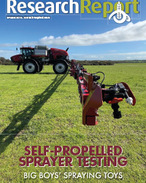This article is 4 years old. Images might not display.
While insect resistance to phosphine is currently very low in WA, it is important to undertake surveillance for management strategies and to ensure continued access to large, valuable export markets.
The survey, run by the Department of Primary Industries and Regional Development (DPIRD), will benchmark the distribution of insect resistance and identify trends and hotspots, while evaluating the efficacy of current resistance management activities.
The surveillance is part of a national investment by the Grains Research and Development Corporation (GRDC), which spans nearly three decades.
Australia is the only country that systematically monitors phosphine resistance, providing an early warning system for the grains industry to develop and implement management strategies.
DPIRD research officer and WA program leader Oonagh Byrne said Australia needed to adhere to a strict ‘nil tolerance' protocol for live insects in grain exports to maintain its position in highly competitive global grain markets.
"To do this, industry needs to minimise the development and spread of insecticide-resistant stored grain pest populations and this investment plays a critical part in achieving this," Dr Byrne said.
The program in WA aims to visit up to 100 participating growers' properties this year to collect insects from in and around grain storage facilities.
The insects collected will be tested for phosphine resistance at the department's laboratories with the results provided to growers and stored in the National Resistance Monitoring Database.
Department grains biosecurity officer Jeff Russell said it was important to know where and what the current level of insect resistance was to inform grain storage management strategies and demonstrate absence and presence to global customers.
"It is important to ensure we remain on top of the risk of insect resistance in WA to protect business profitability, as well as market access," he said.
"Insect resistance needs to be measured and managed carefully and safely, in conjunction with good farm hygiene practices."
Growers who have previously been involved in the survey are encouraged to enlist again. To participate in the phosphine resistance survey, email elisha.cassidy@dpird.wa.gov.au or telephone (08) 9368 3228.























